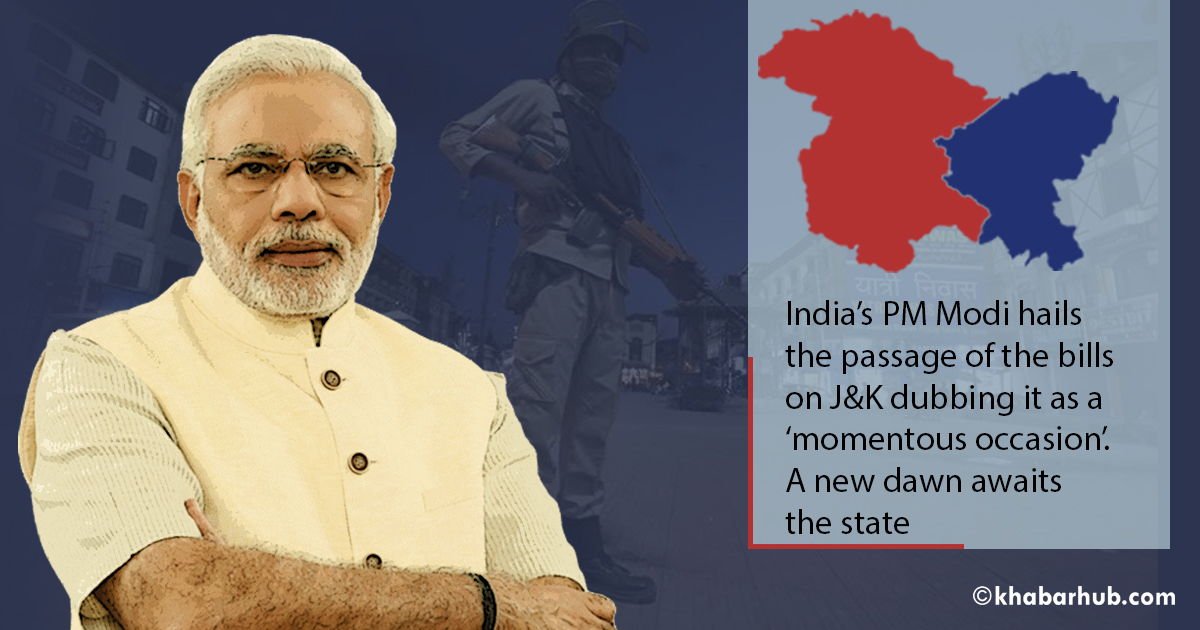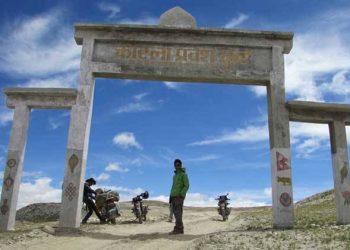KATHMANDU: Just about a little more than two months after India’s independence, Jammu and Kashmir’s (J&K) chose voluntarily to be part of newly independent India.
Maharaja Hari Singh, the ruler of the princely state of Jammu and Kashmir, executed a legal document (called the instrument of accession) on 26 October 1947 to merge with India on unconditional terms.
The accession to India is celebrated every year in J&K as ‘accession day’ on 26 October. Later on, after 5 years, Article 370 was introduced to the Constitution of India on Presidential Order.
Nepali foreign affairs experts describe the move as momentous which will free J&K from the fetters of vested interest groups such as Pakistan-sponsored religious institutions and political parties such as Hurriyat Conference.
Along with it came Article 35 A which empowered the Jammu and Kashmir state’s legislature to define “permanent residents” of the state and provide special rights and privileges to them.
This Article 35 A was added to the Constitution through a Presidential Order on 14 May 1954. Before we analyze why both the articles (370 and 35 A) have been revoked, let’s understand what Article 370 gave to the J&K state.
Among other things, Article 370 exempted the State from the complete applicability of the Constitution of India. The State was allowed to have its own Constitution.
The central legislative powers over the State were limited, at the time of the framing, to the three subjects of defense, foreign affairs, and communications. The combined effects of the provisions given by Articles 370 and 35A gave a shield to Pakistan-sponsored vested interest groups (both political and religious ones) to ramp up the separatists and terrorists in the state.
Unscrupulous Kashmiri politicians and Islamic militants will no longer be in a position to bar development of the state as development fund will directly reach the people living at the grass-root level.
Special status given to state of Jammu and Kashmir for its cultural enrichment became the reasons for hosting ISIS terrorists and other Pak-sponsored mujahedeen as a result of which the Hindus living in the Kashmir valley were forced to flee from their native place threatened by Islamists insurgency of JKLF (Jammu Kashmir Liberation Front) during late 1989 and early 1990.
Many of them were killed, brutally tortured and their land and property snatched away. According to the Indian government, more than 62,000 families are registered as Kashmiri refugees including some Sikh families.
Most families were resettled in Jammu, National Capital Region surrounding Delhi and other parts of India. Regional political parties taking advantage of Articles 370 and 35-A barred the rest of Indians to set up business and industries in the state and never allowed the development fund sent by New Delhi to reach the local people.
They established dynastic rules poisoning the youth by divisive agenda and divested their women of all property rights if they married anybody outside the state. These Kashmiris were allowed to settle down in any part of India but nobody from outside the state was allowed to settle down in Jammu and Kashmir.
The vested interests in the Kashmir Valley never allowed local Kashmiris to come on the path of development as the rest of India does. This ghettoization of locals into hardcore Wahhabi Islam prevented the wave of modernization and development from touching the lives of common Kashmiris under the shelter of Articles 370 and 35A.
The situation of Kashmir went on deteriorating year after year as terrorism from Kashmir began spreading to rest of India. That is why President of India Ram Nath Kovind issued a constitutional order revoking the 1954 order on August 5, 2019, and making all the provisions of the Indian constitution applicable to Jammu and Kashmir which were barred earlier.
The order rendered Article 370 and Article 35A of the Indian constitution ineffective now. The Bhartiya Janata Party (BJP) led government under Prime Minister Narendra Modi took a historic decision by revoking Article 370 of the Constitution which granted special status to Jammu and Kashmir which was misused by the vested interest groups to promote terrorism, perpetuate dynastic rule and disenfranchise women marrying outside the state.
The revocation of the Articles 370 and 35-A necessitated the Central Government to introduce the Jammu and Kashmir Reorganization Bill in Parliament. The state of Jammu and Kashmir is now bifurcated into two Union Territories – the Union Territory of Ladakh and the Union Territory of Jammu and Kashmir. The Union Territory of Ladakh will not have a legislature while Union Territory of Jammu and Kashmir will have.
Nepali foreign affairs experts describe the move as momentous which will free J&K from the fetters of vested interest groups such as Pakistan-sponsored religious institutions and political parties such as Hurriyat Conference.
Arun Subedi, a foreign affairs expert, says, “It was for a long time Republic of India bore with the highly controversial legal provision with one country two flags and two constitutions. Due to special status guaranteed to J&K, state maintained a separate flag and a constitution.”
Now, India is one from Kashmir in the north down to Kanyakumari in the south. Unscrupulous Kashmiri politicians and Islamic militants will no longer be in a position to bar development of the state as development fund will directly reach the people living at the grass-root level.
When asked about militancy and terrorism in the state which can also destabilize the South Asian region, Subedi answers, “India is in firm control of the state. No militants and terrorists at this moment can challenge the intelligence and military might of India and hence these elements will be eliminated in due course of time.”
According to him, things have started to change in Modi-Government and terrorist groups operating from outside India will think twice before they ever decide to meddle with India in times to come.
But, other parts of Kashmir say Pakistan-occupied Kashmir (the part of Kashmir annexed by Pakistan forcefully just after India’s independence and before the Instrument of Accession was signed with India by Maharaja Hari Singh) and Akshai-Chin (the territory administered by China).
Subedi while reflecting on the status of other parts of Kashmir says, “From the Indian side, nobody can raise any questions about the legality of the instrument of accession and recent decisions of Parliament. Yes, rest of the Kashmir outside India will keep on attracting diplomatic engagements and bilateral negotiations with Pakistan and China. Jammu-Kashmir and Laddakh are two union territories; this is quite a legal action which does not allow any other country to object.”
India’s Prime Minister Narendra Modi hailed the passage of the bills on J&K dubbing it as a “momentous occasion” adding that a ‘new dawn awaits the state’. Now, businessmen and traders from the rest of India will be able to set up businesses there and create employment opportunities for local Kashmiris.
However, China raised an objection to the change in the status of Jammu and Kashmir. India, meanwhile, seems to be least bothered about China’s remark set in a negative tone. Foreign ministry secretary Raveesh Kumar strongly countered China’s ‘concern’ saying that the move to change the status of J&K is an ‘internal affairs’.
“As India never comment on the internal affairs of other countries, other countries must not comment negatively on the internal affairs of India.”
Nepal’s former Ambassador to Denmark, Vijay Kant Karna seems to be cautious when he says, “It would be too early to comment anything outright. Let’s see how things go.”
According to him, the international terrorism network which was active in the region can be held ‘responsible’ for creating the situation that led the Indian government to take this step.
Let us hope reorganization of Jammu and Kashmir by Government of India prevents terrorism and militancy from engulfing South Asian region as a network of Pakistani terrorist outfits, Afghani Al-Qaeda, Chechnya militants and ISIS have already been found there.









Comment